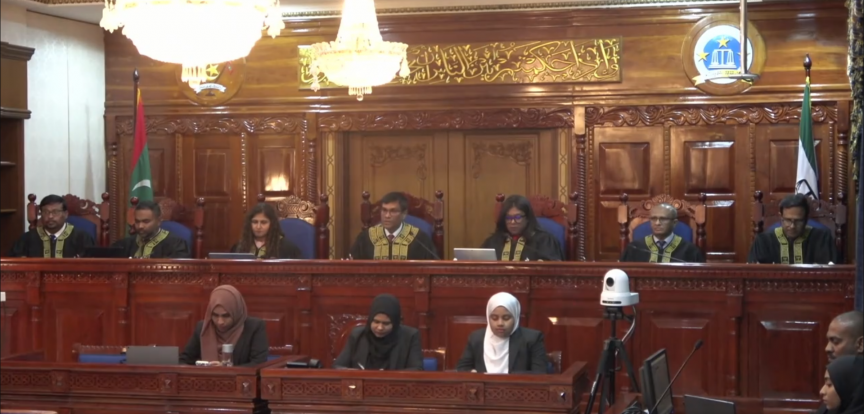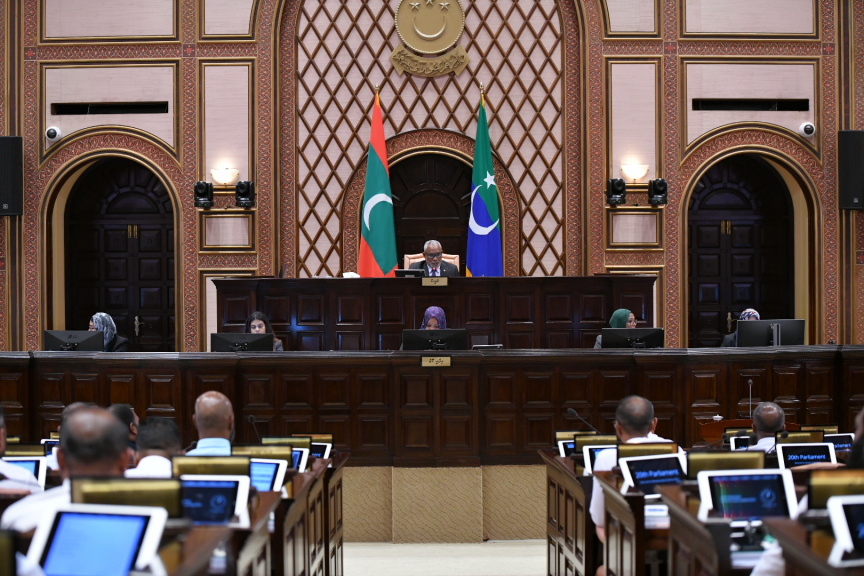
Supreme Court begins hearings in a case challenging anti-defection clauses on February 17, 2025. (Photo/via Supreme Court)
The Supreme Court began hearings on Monday in a case challenging a contentious amendment to add anti-defection provisions to the Maldivian Constitution – nearly three months after the case was filed with the court.
The constitutional amendment in question was submitted, passed and ratified in quick succession on November 20. It added three more circumstances where parliamentarians will lose their seat. They are:
Former Kendhoo MP Ali Hussain, an attorney-at-law, filed a constitutional case with the top court on November 24, seeking to have the new provisions annulled.
The first hearing in the case began at the Supreme Court at 11:00 am on Monday – nearly three months after the petition was filed with the court.
The case is being heard a full bench led by Chief Justice Ahmed Muthasim Adnan, who is joined by Justice Dr. Azmiralda Zahir, Justice Aisha Shujoon Mohamed, Justice Mahaz Ali Zahir, Justice Husnu Al-Suood, Justice Ali Rasheed Hussain, and Justice Dr. Mohamed Ibrahim.
Ali had previously expressed concern over the delay in hearings in the case. He said that while he understands the court would have a lot of cases piled up coming back from recess, he believes there is an urgent need for the court to issue a ruling over the anti-defection provisions.
Ali argues that the constitutional amendment was made in violation of articles 4, 8, 26, 75 and 90 of the Constitution, as well as the fundamental framework of the Constitution itself.

Violation of the articles of the Constitution?
Ali Hussain argues that the amendment violates five specific articles of the Constitution. They are:
All the powers of the State of the Maldives are derived from, and remain with, the citizens.
The powers of the State shall be exercised in accordance with this Constitution.
Unless otherwise provided in this Constitution, every citizen of the Maldives eighteen years of age or older has the right:
a. to vote in elections, and in public referendums, which shall be held by secret ballot;
b. to run for public office;
c. to take part in the conduct of public affairs, directly or through freely chosen representatives.
Members of the People's Majlis should be guided in their actions by considerations of national interest and public welfare foremost, and should not exploit their official positions in any way for their own benefit or for the benefit of those with whom they have special relations. They shall represent not only their constituencies but the country as a whole.
a. No member or other person shall be liable to any proceedings in any court, and no person shall be subject to any inquiry, arrest, detention or prosecution, with respect to anything said in, produced before, or submitted to the People's Majlis or any of its committees, or with respect to any vote given if the same is not contrary to any tenet of Islam.
b. No person or newspaper or journal shall be liable in respect of any report or proceedings made or published under the authority of the People's Majlis, or in respect of any fair and accurate report of the proceedings of the People's Majlis or any of its committees, where this is done in accordance with principles specified by the People's Majlis.
The legislature was passed by the Parliament, of which the ruling People's National Congress (PNC) holds a supermajority, amid protests by parliamentarians from the Maldivian Democratic Party (MDP) – who hold just a dozen seats in the 93-member Parliament.

MDP said at the time that they weren’t opposed to anti-defection provisions in principle. But they do not believe it should apply to parliamentarians who are expelled – a move that they say severely undermines the independence of parliamentarians.
They also objected to the lack of extensive consultation and debate before making constitutional amendments.
Amendments proposed by the MDP to stipulate that parliamentarians expelled from their parties can only be removed after a recall referendum were rejected.
However, President Dr. Mohamed Muizzu defended the contentious constitutional amendments, describing them as crucial for Maldives’ stability.
Meanwhile, Abdul Raheem Abdulla, the Speaker of the Parliament and chairperson of the PNC, said that legislature would be formulated to strengthen the process for expulsion from political parties.